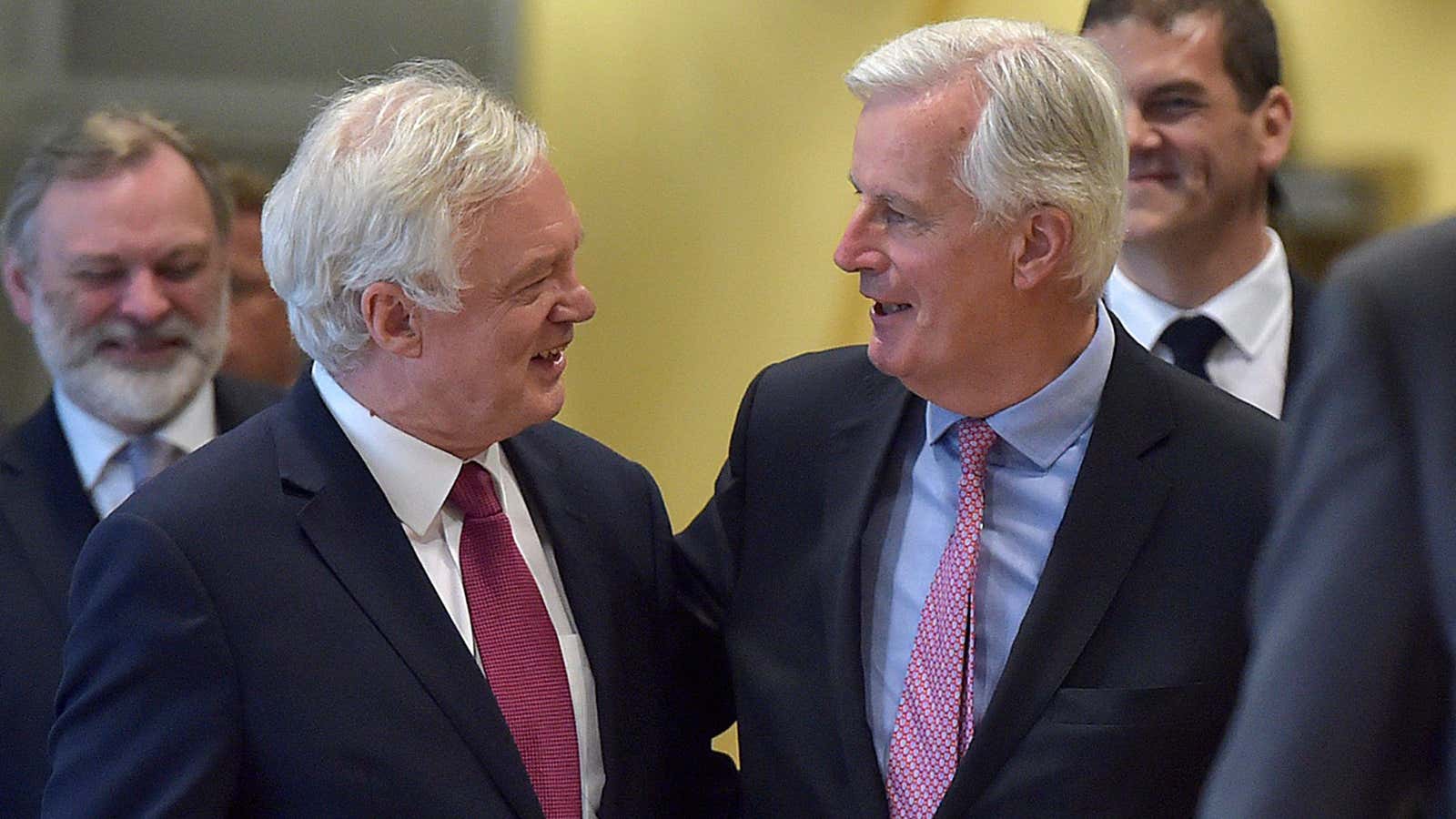The road to Britain’s exit from the EU has been rocky. UK prime minister Theresa May has adopted a hard stance, repeatedly claiming that “no deal is better than a bad deal,” and threatening to walk away if she doesn’t get what she wants (now that negotiations have officially started, she’s started making offers.) The EU, for its part, has fixed the timetable of the negotiations around a three-step plan (paywall) and dismissed any attempt by the UK to cherry-pick the conditions of the deal.
In the world of business, this style of negotiation is called “positional bargaining.” It centers on each side taking fixed positions during deal-making. But the result is almost always a trade-off that leaves people dissatisfied. A simple switch in strategy could change that dynamic, according to William Ury, co-founder of Harvard University’s Program on Negotiation, and Roger Fisher, the Program’s former director. They advise focusing instead on preparing for talks and conducting them in a way that finds an outcome that works for all. This strategy, called ‘principled bargaining,’ is outlined in their book Getting to Yes: Negotiating an Agreement Without Giving In, originally published in 1981, and revised in 2012.
This principle follows four key points:
“Separate the people from the problem”
Focusing too heavily on the individual leaves negotiations vulnerable to egos and emotions. Time would be better spent thinking about to work together towards a common goal, Ury and Fisher write.
The Brexit team is not short on personality. May made a ‘hard’ Brexit seem like the only option. After her snap election flop, this is no longer the case. Negotiators should move from seeing the negotiations as an outcome driven by May, or by one member of a much larger bloc, to one driven by diverse governments responding to various demands.
“Focus on interests, not positions”
Focusing on positions often overlooks what people really want. Instead, the negotiators should look at the underlying reasons driving those decisions, which can promote understanding and compromise.
Despite their disagreements, EU members are united by a need to represent the interests of the individuals in their countries. Cambridge University law lecturer Felix Steffek argues that this is where Brexit efforts should be concentrated —not among states. May is acting as an agent on behalf of the people while also contending with her own thoughts, and those of her party, on how Brexit should be tackled. The interests of all citizens within the EU and the UK should instead drive discussions.
“Invent options for mutual gain”
Fixed positions treat the world as black and white, and it’s anything but. Creative thinking outside the formal negotiation process produces better results.
Professor Lawrence Susskind, co-author of Negotiating on Behalf of Others, argues that the best way to deal with two opposing point of views is to brainstorm ideas. The opt-in, opt-out models of Norway and Switzerland, in which both countries remain non-EU members but still retain ties to the bloc through membership to the European Economic Area (Norway) or European Free Trade Association (both), should act as a springboard to spur ideas on the possibilities available. Susskind says the time is ripe for “exploration of a wide range of options and strategies” which could involve “multiple teams working jointly to generate good ideas on key issues, rather than a final agreement.”
“Insist on using objective criteria”
Moving away from what people are willing or unwilling to do and deferring to a fair standard that all agree on can help keep negotiations on track.
A mediator can help establish that standard during difficult discussions. The UK seems open to outside help: reaching out to the negotiation don himself, William Ury, for advice. It also just hired former New Zealand minister Crawford Falconer as its chief negotiations adviser. Falconer’s separation from European politics and expertise in global trade (he has also worked for the OECD) will hopefully allow him to offer fair and insightful judgments. Settling on what both sides consider crucial to future prosperity, like trade and the economy, will produce a result that is most pleasing to all.
A little flattery doesn’t hurt
Before and during negotiations, Ury and Fisher recommend appealing to your opposing side with gestures that acknowledge their humanity. Benjamin Franklin liked to flatter his adversaries by asking to borrow a certain book. That way, they felt like Franklin owed them. The Brexit team seem to be taking note. On Monday, Brexit talks in Brussels kicked off with the UK’s secretary of state for Brexit, David Davis, bringing a signed first edition copy (paywall) of the mountaineering classic Regards vers Annapurn. The EU’s chief negotiatior Michel Barnier, meanwhile, presented a walking stick from his home region of Savoie. Both men enjoy walking, you see.
